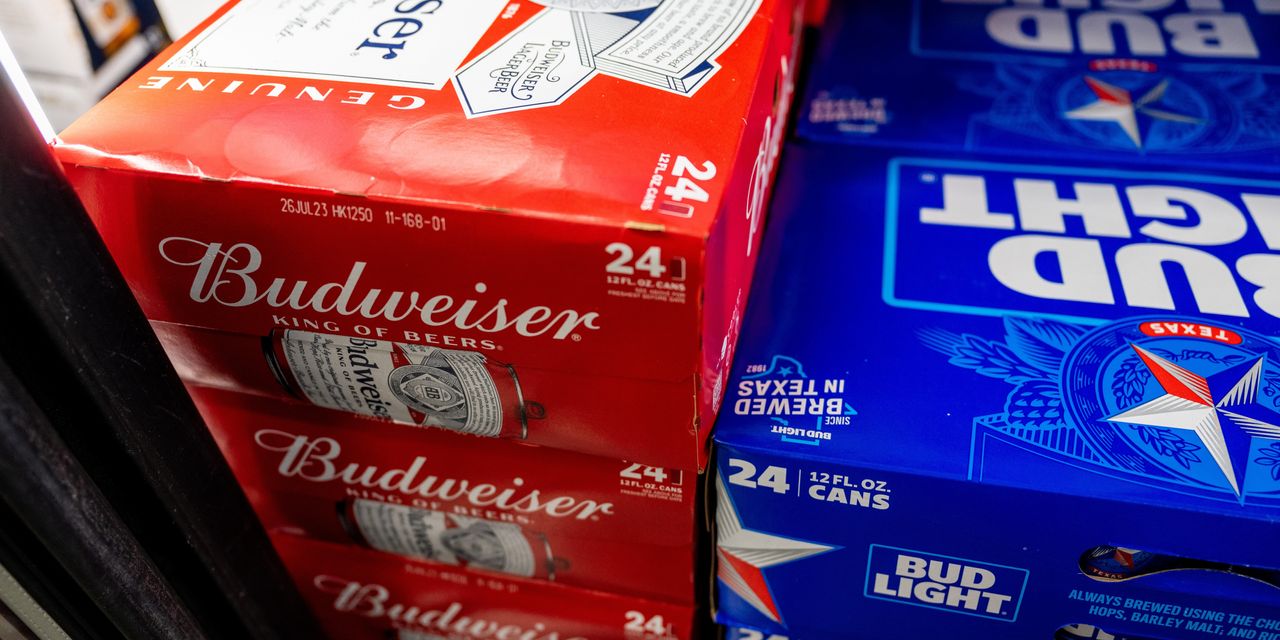Bud Light sales are still falling, as the impact of a boycott against the beer continues to stick. But Morgan Stanley analysts on Thursday said that impact was already reflected into shares of its parent company, Anheuser-Busch InBev, and that AB-InBev’s global footprint and the falling costs of beer ingredients would help sales and margins up ahead even if struggles in the U.S. spill over into next year.
Morgan Stanley assumed coverage of AB-InBev
BUD,
with an overweight rating, a step up from its prior equal-weight rating. The firm bumped its price target on the stock higher, to $68.50 from $64. Shares of AB-InBev were up 0.4% on Thursday.
The analysts also said that AB-InBev’s second-quarter results, set for Aug. 2, could be a clarifying moment for investors.
“While investors are currently sitting on the sidelines, waiting for the company to fully quantify the impact of the Bud Light situation, we see upcoming H1 results as likely timing for such clarification,” the analysts said in a research note.
“We think ABI shares now price in the U.S. Bud Light challenges, which have stabilised, but not the gross margin recovery and de-leveraging upside into next year,” they added later.
The conservative-led boycott against Bud Light began in April, after the brand briefly partnered with Dylan Mulvaney, a trans influencer. That anti-trans anger has translated into weeks of sharp declines, generally above 20%, for Bud Light sales. Mulvaney said Bud Light never reached out to her, despite what she said was “more bullying and transphobia than I could have ever imagined” as a result of the partnership and calls for a boycott.
The fall-off has spread to some of other AB-InBev’s other beer brands, and benefited its rivals. Modelo Especial has recently dethroned Bud Light as the best-selling beer in the U.S.. Constellation Brands Inc.
STZ,
sells Modelo beer in the U.S., after a deal a decade ago to acquire Grupo Modelo’s U.S. beer business from AB-InBev.
Still, the Morgan Stanley analysts emphasized Anheuser-Busch’s worldwide reach, and said that even a 13.5% drop in U.S. yearly sales — broadly, where things stand in the U.S. now — would only mean a 4% drop for the company’s sales overall. And they said double-digit growth expected elsewhere, in regions like South America and the Asia-Pacific, would drive organic sales growth of 6% for the company overall in its fiscal 2023. They also said a “wind-back” on commodity costs and sales incentives to U.S. beer sellers would help margins up ahead.
Still, they didn’t expect much of a break for sales trends in the U.S. They said they expected the 13.5% drop in U.S. sales to ease to a 12% drop in AB-InBev’s fiscal 2024.
Overall, however, the analysts were upbeat on beer sales and profits for next year. Falling ingredient costs would help brewers overall. A pandemic-era jump in U.S. demand for spirits — or hard liquor like gin, Scotch and vodka — had now “normalized,” they said.
Shares of Anhueser-Busch InBev are down 1.4% so far this year. By comparison, the S&P 500 Index
SPX,
is up 18.9% over that period.
Read the full article here



 Casino Welcome Bonus
Casino Welcome Bonus